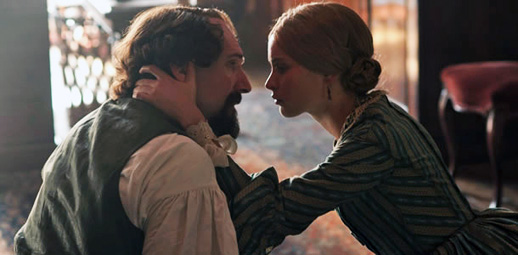
Each year, in the weeks leading up to the commencement of our annual autumnal film festival by the sea, friends and associates turn to VanRamblings for insight into the titles of those films arriving on our shores which have garnered the most buzz, and represent the best odds-on favourites for a transporting time in the dark. If we hold true to form from years past, we’ll be proved right about 80% of the time in our predictions.
Thus today, amidst the 341 films (208 of which are feature length) from 75 countries, the 92 Canadian films, and the 85 non-fiction films which will screen some 500 times at seven venues over the 16-day running time of the 32nd annual Vancouver International Film Festival, we offer Part 1 of VanRamblings’ trusty guide to “What to watch” at VIFF 2013, those films which rank as “best bets” for those impecunious of time or circumstance.
(Note: the titles of the films named below are linked to the VIFF website, which will provide you with information on screening times and venues. Most of the other links are to reviews from a wide variety of publications — ranging from trade magazines like Variety and The Hollywood Reporter, to Screen Daily, The Guardian, The Telegraph, the Globe and Mail, and the Toronto Star’s Grid magazine, and many other august publications, and great online resources like IndieWire and Twitchfilm. Where they’re available, we’ll link to trailers for the films being written about, as well).
First up today on our list of recommended films to screen at VIFF 2013 …
A Story of Children and Film: Awarded a whopping four stars by the often hard-to-please Globe and Mail, The Hollywood Reporter is equally impressed with this quirky, deeply researched exploration of how kids have been portrayed in the cinema. Variety calls the film captivating, while The Guardian’s Peter Bradshaw, when reviewing the film at Cannes earlier this year, awarded the film a can’t-be-topped five stars, saying …
A Story of Children and Film has to be one of the most beguiling events at Cannes, Mark Cousins’ cine-essay about children on film entirely distinctive and always brilliant: a mosaic of clips, images and moments chosen with flair and grace, from familiar sources and the neglected riches of cinema around the world. Cousins offers us his own humanist idealism, the truth of the complex over the luminosity of beribonned purity, a film that while exploring the nature of childhood offers us light flashes of insight.
The history of children in film. For teachers, for parents, for lovers of the cinema, for cinéastes of every description. Guess which film we’re gonna be taking in this coming Thursday, the opening day of VIFF 2013?

The Invisible Woman: Meredith Brody, writing in Thompson on Hollywood, seems quite smitten with Ralph Fiennes’ sophomore directorial feature …
The Invisible Woman, directed by and starring Ralph Fiennes as Charles Dickens, about the love affair Dickens carried on with actress Nelly Ternan (Felicity Jones), begun when she was 17 and the long-married (and father of ten) Dickens was 45, the film surprised and delighted me: the unsentimental, original conceptions of the many nicely delineated characters, the witty script by Avi Morgan, the lavish settings and costumes. From the first long shot of the older Nelly striding along a beach, which looked like a Caillebotte (still thinking in painterly terms, a holdover from Tim’s Vermeer), I was completely enthralled.
Scott Foundas writes that Felicity Jones is “revelatory”, also calling the film “brilliantly acted, vibrantly alive and pulsing with subtle eroticism as it charts the little-known affair of Charles Dickens and the 18-year-old Ellen ‘Nelly’ Ternan.” The Telegraph’s Robbie Collin seems thrilled with The Invisible Woman, as well, as is film critic Catherine Shoard writing in The Guardian.
Blue is the Warmest Colour: Here’s what we wrote to a young woman of our acquaintance this past week about this Cannes’ Palme D’or winner …
Blue is the Warmest Colour is the film taking the screens of the 32nd annual Vancouver International Film Festival that you absolutely want to see, Abdellatif Kechiche’s uncompromising story of a paint-blisteringly intense love affair, a devastating coming-of-age tale that mixes eroticism and sadness, poignancy, loveliness and and passionate young love, as transportative, truthful and sublime a movie experience as you’ll have this year.
The film was a smash at Cannes, Telluride and TIFF, and not only won the top prize at Cannes this year, it won the critics’ prize, as well. Five stars from Robbie Collin in The Telegraph, and another five-star review from one of our favourite critics, Guy Lodge, writing this time for Time Out London. Jessica Kiang, writing for The Playlist, gives the film an “A“, while the always reliable Indiewire critic Eric Kohn is not so generous, awarding Blue is the Warmest Colour only an “A-“. Aahhh.
The Bag of Flour: Mark Adams, the chief film critic for Screen Daily, writes …
A gently powerful real-life story, Kadija Leclere’s feature début Bag Of Flour (Le sac de farine) is an elegantly shot film tracing the unusual life of a young woman from her early years in Belgium through to her times as an adult in a remote Moroccan town, featuring impressive performances from Hafsia Herzi and the always reliable Hiam Abbass.
Deborah Young, in The Hollywood Reporter, says of this tale of a kidnapped child growing up a stranger in her own land …
While Leclere has little good to say about village life, its hunger, poverty and stifling social conventions, it is impossible not to feel sympathy for the horrified, helpless girl who, instead of continuing her studies of history, geography and math, is taught to sew, knit and embroider, the film tracking Sarah from the time she is drugged in a car - only to wake up to find herself in a remote village deep in Morocco’s Atlas mountains, a virtual prisoner at 8 - through her life as a teenager.
Offering a thoughtful reflection on female identity in Arab society, The Bag of Flour seems destined to be one of VIFF 2013’s more memorable films.
Gloria: High on my list of films to screen at VIFF 2013, Chilean actress Paulina García won Best Actress at the Berlin Film Festival for her portrayal of a divorced woman taking a shot at mid-life love, a film The Hollywood Reporter’s David Rooney calls “an engaging character study, and a funny, melancholy and ultimately uplifting tale that offers the viewer an enormously satisfying spell inside the head and heart of a middle-aged woman never puts a foot wrong.” Meanwhile, Guy Lodge (this time writing for Hitfix) gives the film an “A“, while readers award Gloria an A+.
Nebraska: The opening film of VIFF 2013, and winner of Best Actor at Cannes for Bruce Dern, Alexander Payne’s sixth feature relates a melancholy comedic tale that while capturing a life of Midwestern reserve, within the construct of a bittersweet father-son road trip - through an emotionally & economically parched homeland - offers another low-concept, finely etched study of flawed characters stuck in life’s well-worn grooves.
A Touch of Sin: Saving the best for last? Perhaps. Here’s what Toronto Star film critic Jason Anderson wrote in his 10/10 review in The Grid …
Jia Zhangke’s highly volatile and often exhilarating Cannes prizewinner draws closely on four true stories of tragedy and retribution among China’s less privileged. The result blends the spare social realism of the director’s justly acclaimed early efforts, a ruthless strain of satire, and several stylized scenes of extreme violence that wouldn’t be out of place in the yakuza movies of Takeshi Kitano (his production company helped make it). These audacious instances of bloody nastiness are likely to be jarring to admirers of Jia’s more placid previous work but they’re in line with the director’s strategic use of these tales of rage and vengeance to reveal societal fault lines.
David Rooney, in The Hollywood Reporter, while writing about “the widening chasm of social inequality separating the moneyed powerbrokers from the struggling masses — not to mention the despair and violence bred by that disparity,” and taking the “too-diffuse examination of escalating violence in a recklessly modernized society” finds A Touch of Sin compelling, although his overall take on the film is less than enthusiastic. The Guardian’s Peter Bradshaw is more generous in his four star review of the film, writing …
This is a bitter, jagged, disaffected drama, pessimistic about China, pessimistic about the whole world. One characters asks another if he ever feels like travelling abroad. “Why would I?” he replies. “Everywhere is broke. Foreigners come here now.” Jia Zhang-ke’s movie gives us a brutal unwelcome.
Gosh, sounds like perfect film festival fare. C’mon back tomorrow for Part 2 of our 32nd annual Vancouver International Film Festival “best bets”.
![]()
![]()
![]()
![]()
![]()
![]()
![]()
![]()
![]()
VanRamblings’ opening column on the 32nd annual Vancouver International Film Festival, may be found here.